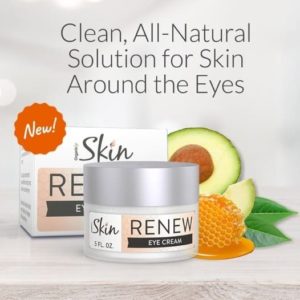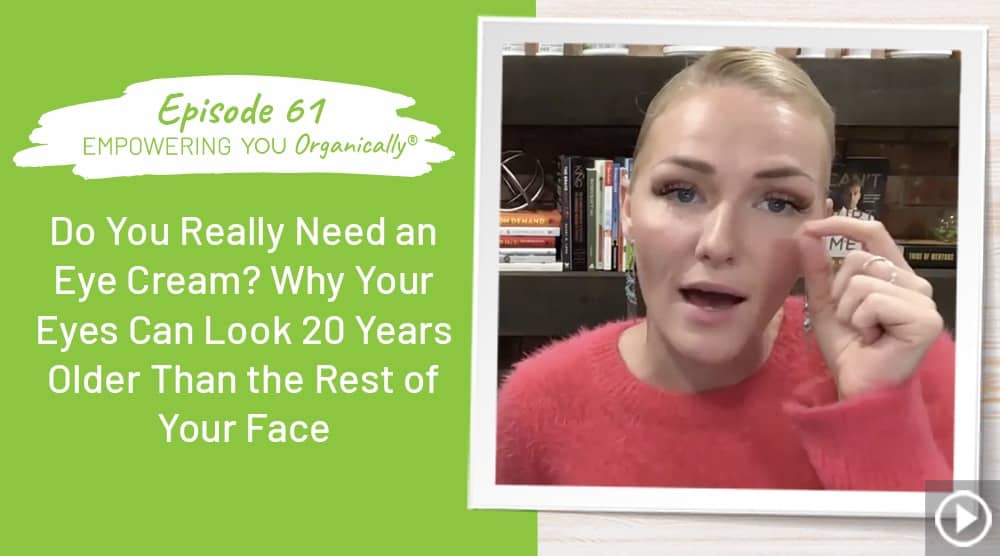Empowering you Organically – Season 8 – Episode 61
Title: Do You Really Need an Eye Cream? Why Your Eyes Can Look 20 Years Older Than the Rest of Your Face.
Hosts: Jonathan Hunsaker, TeriAnn Trevenen
Description: You’ve heard the promises: Eye creams reduce or even erase the signs of aging: fine lines, wrinkles, and dark circles. But aren’t eye creams just more-expensive moisturizers in a smaller package? Tune in this week to get your answer!
Featured Product

* * *
Do You Really Need Eye Cream?
Did you know your eyes can look up to 20 years older than the rest of your face? This is due to those pesky concerns like dark circles and puffiness around the eye. Dark circles occur because the skin below the eye is so thin it actually shows the blood pumping around – the eye puffiness further exacerbates this.
You’ve heard the promises: Eye creams reduce or even erase the signs of aging: fine lines, wrinkles, and dark circles. But aren’t eye creams just more-expensive moisturizers in a smaller package?
Not necessarily, says dermatologist Patricia Farris, MD, a clinical associate professor at Tulane University School of Medicine. “Eye creams are formulated specifically for the delicate skin around the eye, so they tend to be thicker. They contain more oil than a regular facial lotion, and they have a lot of active ingredients aimed at the problems we see around the eyes,” Farris explains.
The skin around the eyes is more fragile, more prone to dryness, and quicker to show age and fatigue. Squinting and constant movement of the eyes also hasten the appearance of lines and wrinkles, and fluids collect under the eyes and cause puffiness and dark circles. Eye creams can address some of these issues.
Here’s an unsettling thought: the skin around the eye loses moisture around 50% faster than the rest of your face, so it’s actually the driest area of your face. However, the skin is so delicate it doesn’t show patchy dryness on the surface, like the rest of our face, even though it’s the most vulnerable area.
Top 5 Reasons You Want to Use an Eye Cream
1. MINIMIZE THE LOOK OF DARK CIRCLES
Nothing highlights your lack of sleep more than a set of dark circles hanging around your eyes. When you’re tired, a chemical called cortisol builds up in your body to give you energy to stay awake. This internal energy shot causes blood vessels to inflate, causing them to push up against the thin skin around your eyes creating dark circles.
Yes, one of the well-known uses for under eye cream is to help mask those dark under eye circles. There are many products out there claiming to do just this, so considering the ingredients in each is key.
Dark circles under the eyes come from genes, sun damage, age, and blood build-up. Sodium ascorbate, or vitamin C, can thicken the skin and help conceal dark circles after about 6 months.
2. SAY GOODBYE TO PUFFINESS
You’ve likely fallen victim to under eye bags at some point. Lack of sleep is no joke–and surely not the look you’re going for.
Due to the horizontal nature of sleeping, blood and fluid accumulate beneath your eyes every night as you sleep. When you wake up, your body takes time to trickle these fluids back into the body (it can take even longer if you’re tired).
3. REDUCE WRINKLES
Whether you’re a victim of smile-lines or sun damage, under eye wrinkles are a fact of life. Luckily, there are a few products you can use to help reduce them and keep your skin looking youthful.
Fine lines and wrinkles come from both sun damage and your skin making less collagen as you age. Collagen helps maintain skin’s elasticity. Vitamin C, peptides, and retinol have boosted collagen production, studies of skin creams show. Ceramide and hyaluronic acid also help; these are moisturizers that help prevent water loss in the skin and improve elasticity.
4. PREVENT WRINKLES
Of course, getting rid of present wrinkles is something most of us think to do, but many people neglect the importance of prevention. Being proactive about potential wrinkles by using anti-aging products will save yourself the stress and hassle of waiting until they appear
Skin around the eyes is 40 per cent thinner and it’s also the least elastic part of your face. That means it doesn’t have the bounce back that your cheeks might have, even though we tend to focus mostly on the complexion at large–big mistake.
Organixx’s RENEW can work hard to undo your sins, even if they run deep, and it will continue to protect the delicate area by hydrating the skin and improving its softness and elasticity. The product contains witch hazel, an anti-inflammatory, meaning it will protect from environmental stressors too.
5. PREP YOUR SKIN FOR MAKEUP
While there are plenty of products that will prep your skin for your daily makeup routine, under eye cream is one that most people overlook. With its firming and smoothing qualities, it has the power to make all the difference in how your makeup applies and wears throughout the day.
It’s important to note here that this doesn’t just pertain to women. Men benefit greatly from a healthy skincare regimen as well!
3 Ingredients You Should Never Put Near Your Eyes
New beauty and skin care products surface every day with promises of better, younger-looking eyes. But before you apply them on and around your peepers, you might (read: definitely) want to check the ingredient list on the back.
We discussed the top ingredients to avoid in your skincare on episodes 55 & 56. Be sure to check those out if you haven’t already!
According to New York oculoplastic surgeon Irene Gladstein, MD, your go-to product probably contains an irritant that may be pose a threat to your eye health. “There is a myriad of skin care ingredients that, when used in close proximity to the eye, may cause undesirable—and frankly dangerous—ophthalmic concerns.“
Here are the top three culprits to look out for in order to keep sensitivity far, far away.
Parabens
Found in most products that contain any amount of water, Dr. Gladstein says preservatives like parabens and benzalkonium chloride (BAK) are common in makeup and skin care products, as well as makeup removers. While preservatives work to prevent bacteria from forming in your products, ingredients like parabens or BAK can also cause adverse reactions in some when placed too close to the eye.
Heavy metals
“Nickel and chrome, two heavy metals seen in all sorts of makeup products, are known to be responsible for skin and eye allergies,” explains Dr. Gladstein. However, don’t confuse these with metals such as iron, which plays an important role in our body and is necessary for proper function.
Retinols
Don’t worry: Retinols are still the gold standard of anti-aging ingredients. But, Dr. Gladstein says you have to be careful about where (and how carefully) you apply it. “When used in close proximity to the sensitive lining of the eye, retinols may precipitate dry eye and significant irritation.” The solution: Don’t get too close to your eye and use a retinol that’s specifically formulated for use in that area instead of your facial retinol. (Many will contain hydrating ingredients that will soothe or minimize any irritation around the delicate area.)
Renew Eye Cream
- New product from Organixx.
- All of the ingredients are USDA-certified organic ingredients. TeriAnn has formulated it.
* * *
Subscribe to Empowering You Organically
Never miss an episode!
APPLE PODCASTS SPOTIFY GOOGLE PODCASTS



